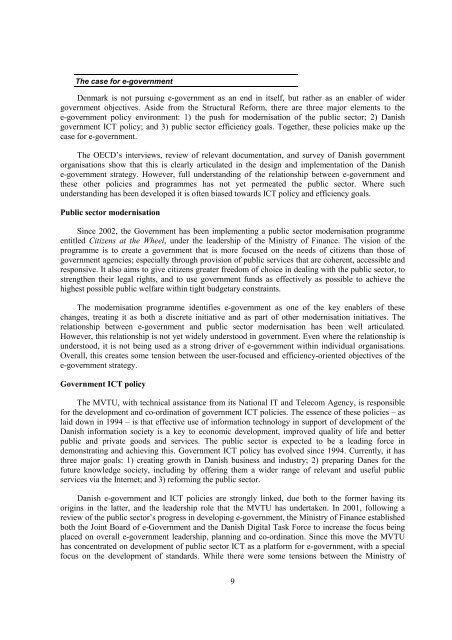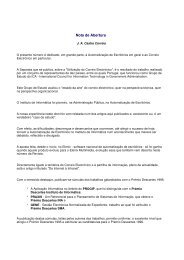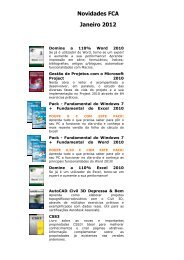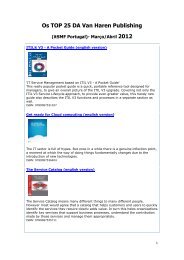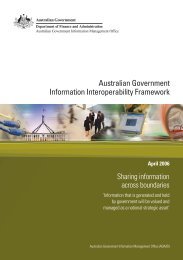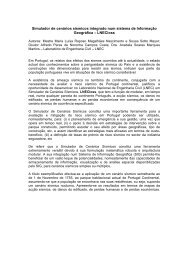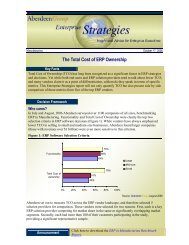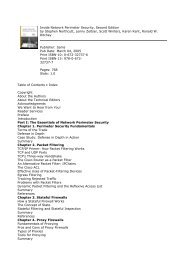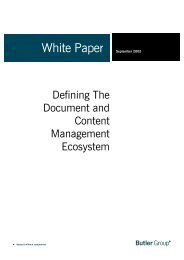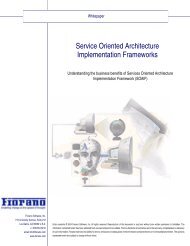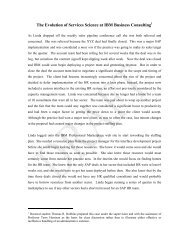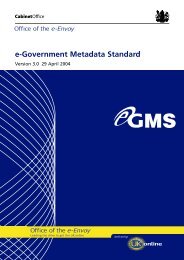OECD Peer Review of E-Government in Denmark - ePractice.eu
OECD Peer Review of E-Government in Denmark - ePractice.eu
OECD Peer Review of E-Government in Denmark - ePractice.eu
Create successful ePaper yourself
Turn your PDF publications into a flip-book with our unique Google optimized e-Paper software.
The case for e-government<br />
<strong>Denmark</strong> is not pursu<strong>in</strong>g e-government as an end <strong>in</strong> itself, but rather as an enabler <strong>of</strong> wider<br />
government objectives. Aside from the Structural Reform, there are three major elements to the<br />
e-government policy environment: 1) the push for modernisation <strong>of</strong> the public sector; 2) Danish<br />
government ICT policy; and 3) public sector efficiency goals. Together, these policies make up the<br />
case for e-government.<br />
The <strong>OECD</strong>’s <strong>in</strong>terviews, review <strong>of</strong> relevant documentation, and survey <strong>of</strong> Danish government<br />
organisations show that this is clearly articulated <strong>in</strong> the design and implementation <strong>of</strong> the Danish<br />
e-government strategy. However, full understand<strong>in</strong>g <strong>of</strong> the relationship between e-government and<br />
these other policies and programmes has not yet permeated the public sector. Where such<br />
understand<strong>in</strong>g has been developed it is <strong>of</strong>ten biased towards ICT policy and efficiency goals.<br />
Public sector modernisation<br />
S<strong>in</strong>ce 2002, the <strong>Government</strong> has been implement<strong>in</strong>g a public sector modernisation programme<br />
entitled Citizens at the Wheel, under the leadership <strong>of</strong> the M<strong>in</strong>istry <strong>of</strong> F<strong>in</strong>ance. The vision <strong>of</strong> the<br />
programme is to create a government that is more focused on the needs <strong>of</strong> citizens than those <strong>of</strong><br />
government agencies; especially through provision <strong>of</strong> public services that are coherent, accessible and<br />
responsive. It also aims to give citizens greater freedom <strong>of</strong> choice <strong>in</strong> deal<strong>in</strong>g with the public sector, to<br />
strengthen their legal rights, and to use government funds as effectively as possible to achieve the<br />
highest possible public welfare with<strong>in</strong> tight budgetary constra<strong>in</strong>ts.<br />
The modernisation programme identifies e-government as one <strong>of</strong> the key enablers <strong>of</strong> these<br />
changes, treat<strong>in</strong>g it as both a discrete <strong>in</strong>itiative and as part <strong>of</strong> other modernisation <strong>in</strong>itiatives. The<br />
relationship between e-government and public sector modernisation has been well articulated.<br />
However, this relationship is not yet widely understood <strong>in</strong> government. Even where the relationship is<br />
understood, it is not be<strong>in</strong>g used as a strong driver <strong>of</strong> e-government with<strong>in</strong> <strong>in</strong>dividual organisations.<br />
Overall, this creates some tension between the user-focused and efficiency-oriented objectives <strong>of</strong> the<br />
e-government strategy.<br />
<strong>Government</strong> ICT policy<br />
The MVTU, with technical assistance from its National IT and Telecom Agency, is responsible<br />
for the development and co-ord<strong>in</strong>ation <strong>of</strong> government ICT policies. The essence <strong>of</strong> these policies – as<br />
laid down <strong>in</strong> 1994 – is that effective use <strong>of</strong> <strong>in</strong>formation technology <strong>in</strong> support <strong>of</strong> development <strong>of</strong> the<br />
Danish <strong>in</strong>formation society is a key to economic development, improved quality <strong>of</strong> life and better<br />
public and private goods and services. The public sector is expected to be a lead<strong>in</strong>g force <strong>in</strong><br />
demonstrat<strong>in</strong>g and achiev<strong>in</strong>g this. <strong>Government</strong> ICT policy has evolved s<strong>in</strong>ce 1994. Currently, it has<br />
three major goals: 1) creat<strong>in</strong>g growth <strong>in</strong> Danish bus<strong>in</strong>ess and <strong>in</strong>dustry; 2) prepar<strong>in</strong>g Danes for the<br />
future knowledge society, <strong>in</strong>clud<strong>in</strong>g by <strong>of</strong>fer<strong>in</strong>g them a wider range <strong>of</strong> relevant and useful public<br />
services via the Internet; and 3) reform<strong>in</strong>g the public sector.<br />
Danish e-government and ICT policies are strongly l<strong>in</strong>ked, due both to the former hav<strong>in</strong>g its<br />
orig<strong>in</strong>s <strong>in</strong> the latter, and the leadership role that the MVTU has undertaken. In 2001, follow<strong>in</strong>g a<br />
review <strong>of</strong> the public sector’s progress <strong>in</strong> develop<strong>in</strong>g e-government, the M<strong>in</strong>istry <strong>of</strong> F<strong>in</strong>ance established<br />
both the Jo<strong>in</strong>t Board <strong>of</strong> e-<strong>Government</strong> and the Danish Digital Task Force to <strong>in</strong>crease the focus be<strong>in</strong>g<br />
placed on overall e-government leadership, plann<strong>in</strong>g and co-ord<strong>in</strong>ation. S<strong>in</strong>ce this move the MVTU<br />
has concentrated on development <strong>of</strong> public sector ICT as a platform for e-government, with a special<br />
focus on the development <strong>of</strong> standards. While there were some tensions between the M<strong>in</strong>istry <strong>of</strong><br />
9


